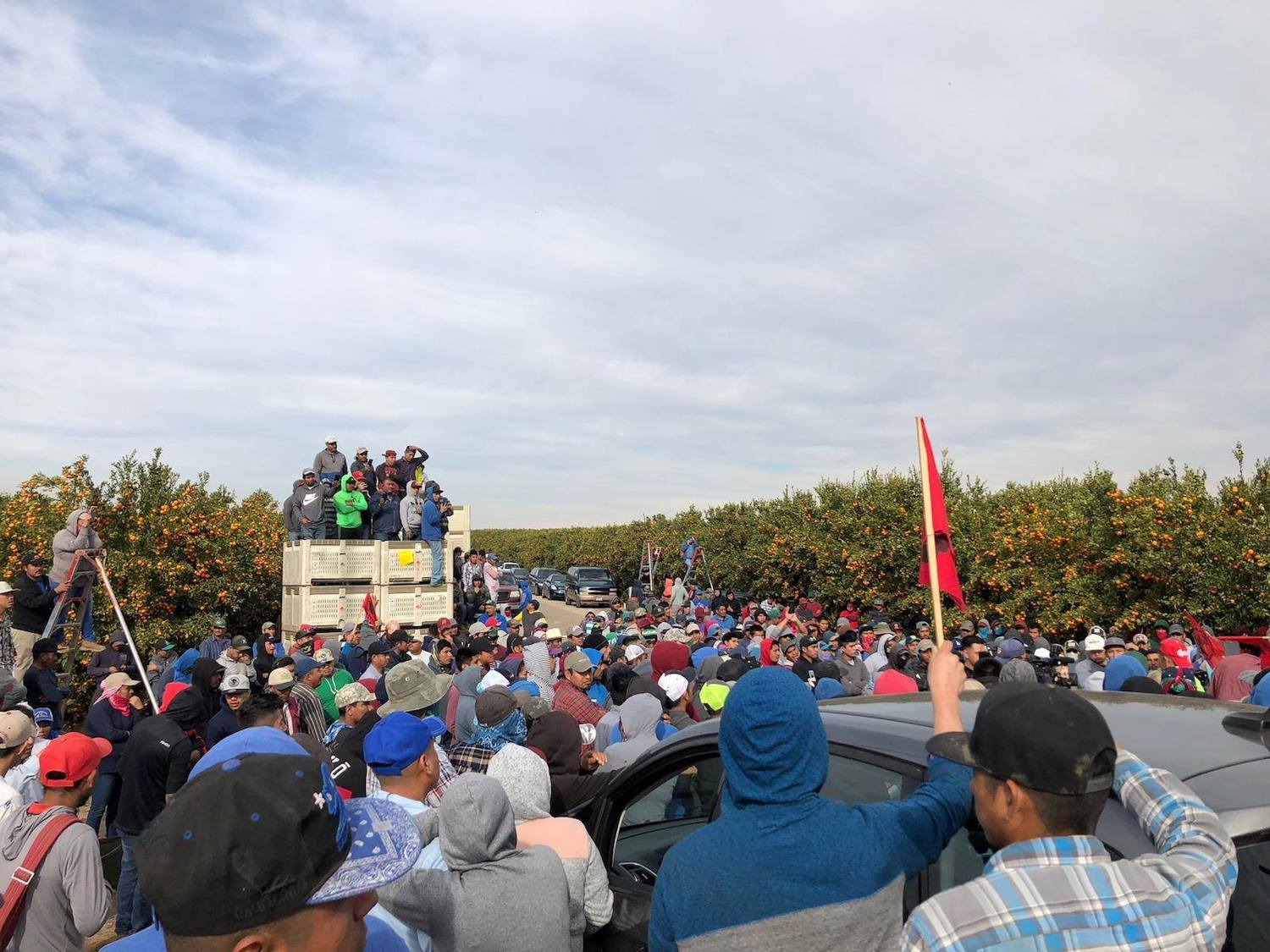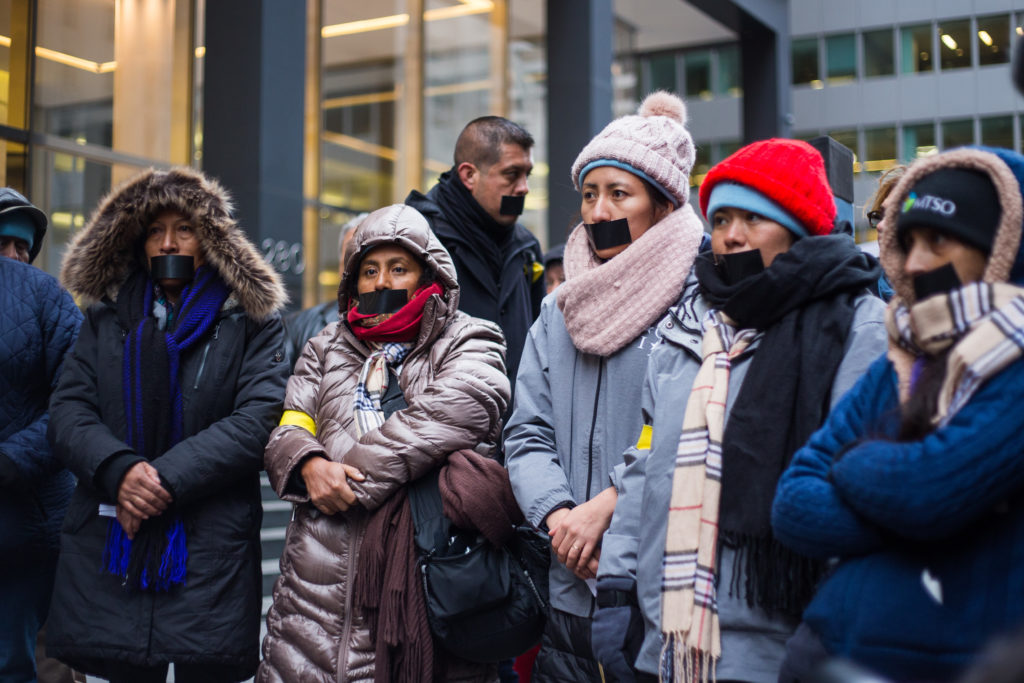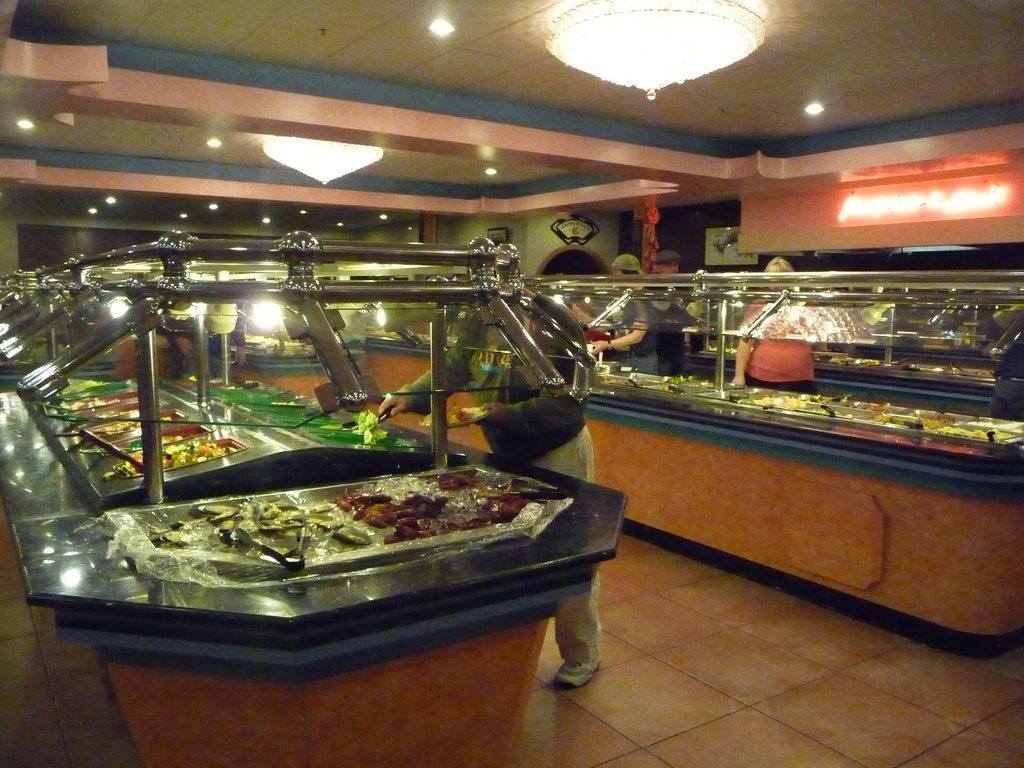
United Farm Workers of America
UPDATE, May 13, 12:15 PM, EST: This story has been updated with comments from the California Farm Labor Contractor Association.
In California on Tuesday, 1,800 subcontracted orange pickers are back to work after Wonderful Citrus, one of the country’s largest fruit companies, agreed to restore the price it pays for bins of harvested mandarin oranges, The Los Angeles Times reports.
The decision comes after a four-day strike by the farmworkers, who were employed by a third-party labor contractor to pick in orchards owned by the Wonderful Company, a billion-dollar agricultural conglomerate known for its Pom brand pomegranate juice. (The company is also one of the state’s largest water users. It consumes more water than the entire city of Los Angeles to grow its crops.)
The Wonderful Company had cut bin rates by more than 10 percent, from $53 per bin down to $48, The Bakersfield Californian reported last week. At the time, a spokesman for Wonderful said the pay cut was due to a seasonal transition from filling bins of clementines to the larger mandarin oranges, both of which are marketed under the brand name Halos. Whether or not that’s a regular occurrence is unclear. Armando Elenes, secretary treasurer of the United Farm Workers, told The New Food Economy in an email that the striking workers allege they had been paid the higher rate since October, regardless of the variety.
The strike is noteworthy not just because it’s a victory for the Farm Workers, the legendary grape pickers union that backed the Wonderful pickers on strike, after a failed campaign on another orchard. It also reveals hidden truths about the complex system by which farmworkers are paid.
As we’ve reported, farmworkers have long been excluded from protections afforded to other workers. That modern-day practice was made possible by the federal Fair Labor Standards Act of 1938, which established minimum-wage and overtime standards, but excluded agricultural workers from its scope. To this day, many states also exempt farmworkers from their own minimum-wage and overtime laws.
There appears to be a different, though still legal, pay system for farmworkers, depending on whether or not they are hired directly by a farm operator, or a third-party company, known as a farm labor contractor (FLC), that provides a variety of services for farm companies. Since 2010, FLCs have been California’s largest employer of farmworkers, adding thousands of jobs every year as direct hires made by farm operators have stagnated. Some of these contractors are charged with assembling work crews and moving them from orchard to orchard. Others actually lead and manage them in the fields. Either way, they’re an attractive option for farm operators who don’t have the expertise to staff and manage their workers, according to Anthony Raimondo, a Bakersfield-based attorney who represents FLCs.
The citrus industry had depended on contracted labor since the Bracero program brought temporary farmworkers to orchards in the 1940s and 1950s. Gaspar Rivera Salgado, a project director at UCLA Labor Center, attributes the recent rise of subcontracted farm labor, and the eclipse of direct hires, to several factors, like an uptick in farmworker availability after the 2008 depression and subsequent crash of the construction industry. Salgado also mentions the increasing consolidation of farm companies, particularly in the grape industry, that leaves operators with vast acres of production they struggle to staff.
 United Farm Workers of America
United Farm Workers of America Farmworkers employed by FLCs—which represent around two-thirds of crop workers in California—typically earn far less than direct hires. The workers at Wonderful Citrus are no exception
“You need huge amounts of labor at specific periods of time,” he says. “And there’s no way that one company can process them. So they’re relying on labor subcontractors who can manage large crews of people.”
Salgado cites liability as an incentive to subcontract farm labor. Since the Reagan administration, employers who knowingly hire undocumented immigrants have been held liable, and can be fined thousands of dollars per worker. In California, where 90 percent of farmworkers were born in Mexico, and 60 percent work here illegally, that liability has evidently been shifted to subcontractors, which helps obscure a farm’s relationship to the pickers working its orchards.
Labor advocates agree that an intermediary allows a farm operator to dodge some responsibility. By the letter of the law, operators are responsible for pickers on their fields, and are thus on the hook for unpaid wages. In practice, pursuing claims on behalf of subcontracted workers can be tricky, because farmworkers—particularly those on citrus orchards, moving from farm to farm, sometimes in a single day—might not know who they’re actually working for, according to a state official who was not authorized to speak to the press.
Farmworkers employed by FLCs, which represent around two-thirds of crop workers in California, typically earn far less than direct hires. The workers at Wonderful Citrus are no exception. There, the contracted workers, who typically fill less than two bins of mandarin oranges during an eight-hour shift, earn around $12 an hour, on average, at piece-rate, which is the state’s minimum wage. Meanwhile, Wonderful’s direct hires, some of whom are performing the exact same job, according to Salgado, are earning at least $15 an hour.
This is a common disparity. According to a recent study of California’s agricultural workers, while a crop worker hired full-time by a farm made an average of $32,500, a contracted “crop support worker” made an average of $27,500. In fruit and nut operations specifically, direct hires earned around $14.40 an hour, and their contract counterparts earned an average of $10.80—potentially representing major savings for growers of expensive, thirsty, and labor-intensive crops.
I’ve written about the differences between contracted workers and employees, and the fight to resolve them in California, where GrubHub drivers and other gig economy workers want the benefits that come with full-time employment. Many of the same dynamics are at play in farm work, too. The lower pay isn’t the only difference between being a contracted worker and one employed directly by a farm operator. A contracted farmworker might have to buy their own shears, and might not be paid for hours spent idling on a field, waiting for direction. Predictability is one difference. Another is the great distances traveled. A contracted worker who lives in Bakersfield, for example, might have to travel two hours north to Madera, if that’s what their boss needs.
(Lupe Sandoval, the executive director of the California Farm Labor Contractor Association, a business association based in Sacramento, points out that the state’s agricultural wage order requires employers to provide tools to workers, and that recent legislation entitles all workers to be paid for idle time. In an email to The New Food Economy, he says that contractors should be familiar with these requirements, because they must submit to annual training and testing to keep their licenses.)
But even if we’re seeing some indications that California’s contracted farmworkers may soon be afforded some of the same rights as employees, it’s clear the model—in low-skill jobs in warehouses, in farms, and delivery services alike—isn’t going anywhere. “This is the way that you do farm work,” says Salgado. “The traditional long-term jobs in big companies are fewer and far between—this is how it’s done.”
Correction: The headline has been changed to reflect the location of the strike at Wonderful Citrus, a division of The Wonderful Company, which also produces Pom Wonderful juice. The nature of a United Farm Workers election has also been clarified.










